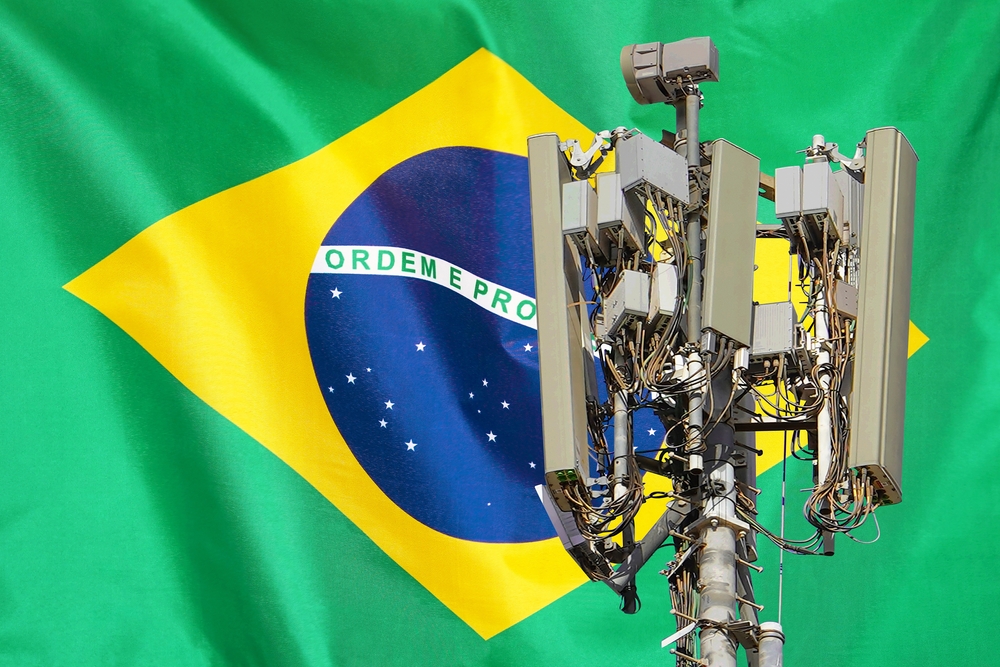Table of Content
ToggleIntroduction
Brazil’s state-owned oil giant Petrobras has recently ventured into Bitcoin mining, marking a significant shift in how traditional energy companies view cryptocurrency. Petrobras is exploring Bitcoin mining as a sustainable solution to utilize waste gas from oil extraction that would otherwise be flared into the atmosphere. This innovative approach not only addresses environmental concerns but also potentially creates a new revenue stream for the company.
The move comes as part of Petrobras’ broader strategy to establish a new research and development division focused on blockchain applications. By repurposing flared gas to power Bitcoin mining operations, the company joins a growing trend of oil producers looking to maximize efficiency and profitability while reducing their environmental footprint.
Key Takeaways
- Petrobras is converting waste gas from oil extraction into energy for Bitcoin mining operations, improving both sustainability and profitability.
- The Brazilian oil company has launched a research division exploring blockchain technologies including mining and tokenization as complementary business activities.
- This initiative represents a convergence between traditional energy markets and cryptocurrency, potentially creating new economic opportunities while addressing environmental concerns.
Overview of Petrobras
Petrobras stands as Brazil’s state-owned oil giant with significant influence in global energy markets. The company has recently expanded its vision beyond traditional oil and gas operations to include innovative technologies like blockchain and Bitcoin mining.
Petrobras’ Role in Global Energy
Petrobras (Petróleo Brasileiro S.A.) operates as Brazil’s largest oil producer and a major player in the global energy sector. Founded in 1953, the company maintains a dominant position in Brazil’s petroleum industry, handling everything from exploration to distribution.
The company controls significant offshore oil fields, particularly in the pre-salt layer of the Atlantic Ocean. These reserves have transformed Brazil into one of the world’s important oil producers.
Petrobras employs thousands of workers and contributes substantially to Brazil’s economy. Its operations span across 25 countries, though its primary focus remains on domestic production and refining.
The firm’s strategic importance extends beyond economics, as it plays a crucial role in Brazil’s energy security and independence policies.
Recent Developments and New Notes Offering
Petrobras has recently made headlines by exploring Bitcoin mining initiatives as part of its research and development programs. This marks a significant shift in the company’s technological approach.
The company launched a Global Notes offering in late 2024, raising capital for various operational expansions and technological innovations. These bonds attracted international investors despite fluctuating market conditions.
Petrobras has also developed a biomethane marketplace with GoLedger, leveraging blockchain technology to enhance operational transparency. This project demonstrates the company’s commitment to integrating emerging technologies.
The firm’s financial strategy has pivoted toward diversification, with investments in renewable energy becoming a growing priority alongside its traditional petroleum operations.
Investment Activity and Forward-Looking Statements
Petrobras has increasingly focused on forward-looking investment strategies, particularly in sustainable energy. The company is exploring renewable energy sources for Bitcoin mining, which could significantly reduce the carbon footprint of cryptocurrency operations.
In recent investor statements, Petrobras outlined plans to allocate approximately 15% of its capital expenditure toward innovation and technology integration by 2026. These investments target operational efficiency and environmental sustainability.
The company’s leadership has issued cautious but optimistic forward-looking statements about oil price projections and production targets. These projections acknowledge market volatility while emphasizing Petrobras’s adaptability.
Risk factors mentioned in recent filings include regulatory changes, environmental concerns, and political uncertainties in Brazil. Despite these challenges, Petrobras continues researching Bitcoin mining as a complementary activity to its core operations.
Bitcoin Fundamentals
Bitcoin operates on core principles that set it apart from traditional currencies while reshaping how value moves through financial systems. The technology behind Bitcoin has implications far beyond digital transactions, affecting markets worldwide.
Understanding Cryptocurrency
Bitcoin is a decentralized digital currency that operates without a central authority or bank. Created in 2009 by an anonymous entity known as Satoshi Nakamoto, it relies on blockchain technology to record all transactions across a network of computers.
Unlike traditional currencies, Bitcoin has a fixed supply cap of 21 million coins. This scarcity is programmed into its code, making it resistant to inflation – a stark contrast to fiat currencies that can be printed at will.
Bitcoin transactions are verified through a process called mining, which requires significant computational power. Miners solve complex mathematical problems to validate transactions and add them to the blockchain.
The security of Bitcoin comes from its cryptographic nature. Each transaction is secured using advanced encryption methods, making the network highly resistant to fraud or manipulation.
Bitcoin’s Impact on Capital Markets
Bitcoin has emerged as a new asset class that’s reshaping traditional investment portfolios. Institutional investors now allocate funds to Bitcoin alongside stocks, bonds, and commodities.
The cryptocurrency’s volatility has created new trading opportunities in capital markets. Bitcoin futures, options, and ETFs allow investors to gain exposure without holding the actual asset.
Bitcoin’s rise has prompted central banks worldwide to explore digital currencies of their own. These Central Bank Digital Currencies (CBDCs) represent attempts to modernize monetary systems while maintaining governmental control.
Some key impacts on capital markets include:
- Creation of 24/7 trading markets that never close
- Introduction of fractional ownership for high-value assets
- Development of new financial products built on blockchain technology
- Reduction in cross-border transaction costs and settlement times
Interactions Between Petrobras and Cryptocurrency
Brazil’s state-owned oil giant Petrobras has recently entered the cryptocurrency space through several research initiatives focused on Bitcoin mining and blockchain technology. These developments represent a significant shift in how traditional energy companies are exploring digital assets.
Petrobras’ Approach to Blockchain
Petrobras is actively launching research and development initiatives that include Bitcoin mining and blockchain technology exploration. The company has recognized the potential value of digital assets within its operational framework.
Marcelo Curi, a blockchain and crypto architect at Petrobras, has confirmed the company’s interest in Bitcoin mining as a complementary activity to its primary oil and gas operations. This strategic move positions Petrobras among forward-thinking energy corporations embracing digital innovation.
One of the most innovative aspects of Petrobras’ approach involves repurposing flared gas from oil extraction to power Bitcoin mining operations. This method transforms what would otherwise be waste into a valuable resource.
Potential Synergies
The integration of Bitcoin mining with Petrobras’ operations creates several notable synergies. By utilizing excess natural gas that would otherwise be flared, Petrobras can simultaneously reduce environmental impact and generate additional revenue streams through cryptocurrency mining.
This dual-purpose approach represents a sustainable shift in energy management practices within the fossil fuel industry. It showcases how traditional energy companies can adopt innovative technologies to improve efficiency.
Beyond mining, Petrobras is exploring tokenization as part of its digital asset revolution. This could potentially allow for new forms of investment in energy infrastructure projects or even tokenized representation of energy commodities.
The company’s blockchain initiatives may also improve supply chain transparency and operational efficiency across its extensive oil and gas production network.
Financing and Investments
Petrobras is exploring innovative financial strategies that include both traditional capital raising and cryptocurrency initiatives. The company’s approach balances conventional financial instruments with emerging blockchain technologies.
Petrobras’ Capital Raising Tactics
Petrobras has implemented a robust capital raising strategy to fund its ambitious $111 billion investment plan spanning five years. This plan allocates $98 billion for projects already in progress and $13 billion for developing initiatives. The Brazilian oil giant frequently uses New Notes and Cash Tender Offers to refinance debt and optimize its capital structure.
Bondholders can identify Petrobras securities through specific Cusip/ISIN numbers, providing transparency in the secondary market. The company maintains dedicated Bondholder Services to support investor relations and facilitate seamless transactions in capital markets.
Petrobras’ financing approach has evolved to include sustainable projects, particularly those that repurpose energy resources that would otherwise go to waste.
Bitcoin as an Investment Asset
Petrobras has recognized Bitcoin mining as both an operational strategy and investment opportunity. By converting excess natural gas that would typically be flared into energy for Bitcoin mining, the company creates a new revenue stream while addressing environmental concerns.
This initiative allows Petrobras to balance environmental responsibilities with financial growth. The company’s history of blockchain integration extends beyond Bitcoin mining, having previously developed a biomethane marketplace with GoLedger.
By using renewable energy for Bitcoin mining, Petrobras can significantly reduce the carbon footprint typically associated with cryptocurrency operations, creating a more sustainable investment model.
Risks and Security Aspects
While leveraging Bitcoin mining presents opportunities for Petrobras, it also introduces significant security challenges that require robust protective measures. The intersection of energy production and cryptocurrency operations creates unique vulnerabilities that must be addressed proactively.
Petrobras’ Security Measures
Petrobras has implemented multi-layered security protocols to protect its Bitcoin mining operations. The company utilizes advanced encryption technologies for all mining-related communications and transactions. These systems are regularly audited by third-party cybersecurity firms to ensure compliance with international standards.
Physical security at mining facilities includes biometric access controls, 24/7 surveillance, and dedicated security personnel. This is particularly important as Petrobras repurposes flared gas from oil extraction for mining operations, creating potential physical vulnerabilities at extraction sites.
The company has also established a specialized cybersecurity team focused exclusively on cryptocurrency operations. This team monitors network activity continuously for suspicious patterns and potential intrusion attempts.
Bitcoin’s Security Challenges
Bitcoin’s underlying blockchain technology offers inherent security through its distributed ledger system, but vulnerabilities exist in surrounding infrastructure. Cryptocurrency cybersecurity risks include private key theft, exchange hacks, and sophisticated phishing attempts targeting crypto users.
For Petrobras, 51% attacks represent a theoretical risk, though highly unlikely due to Bitcoin’s scale. More pressing concerns include:
- Wallet security – protecting private keys controlling company assets
- Secure mining pools – ensuring participation in trusted mining collectives
- Protection against malware specifically targeting mining equipment
The company must also consider regulatory compliance risks as rules around cryptocurrency evolve in Brazil and globally. This includes anti-money laundering (AML) and know-your-customer (KYC) requirements.
Combating Spam and Abuse
Petrobras has developed comprehensive policies to prevent potential abuse of its Bitcoin mining infrastructure. These include strict access controls limiting who can interact with mining systems and transaction monitoring to detect suspicious patterns.
The company employs machine learning algorithms that identify and block potential spam transactions that could affect mining efficiency. This helps maintain optimal performance while preventing resource abuse.
Internal compliance teams conduct regular reviews of all mining activities to ensure alignment with both company policies and legal requirements. This includes monitoring for potential wash trading or other manipulative behaviors.
To further reduce abuse risks, Petrobras participates in industry information-sharing networks where companies exchange data about emerging threats and attack patterns. This collaborative approach strengthens the overall security posture of the mining operation.
Legal and Regulatory Considerations
The intersection of Petrobras’ operations and Bitcoin mining faces complex regulatory challenges in Brazil. Current governance frameworks and cryptocurrency regulations create both opportunities and constraints for this potential partnership.
Petrobras’ Compliance Framework
Petrobras operates under strict corporate governance and compliance practices that guide all business decisions. These practices ensure that any new venture, including potential Bitcoin mining operations, adheres to ethical standards and regulatory requirements.
The state-owned oil company must consider its obligations to shareholders, the Brazilian government, and environmental regulations when exploring cryptocurrency initiatives. Any Bitcoin-related projects would need approval through Petrobras’ established governance channels.
Forward-looking statements from Petrobras regarding cryptocurrency ventures must comply with securities regulations and disclosure requirements. The company’s internal compliance team would need to develop specific protocols for cryptocurrency operations to prevent money laundering and ensure transparency.
Bitcoin’s Regulatory Landscape
Brazil currently lacks comprehensive legislation specifically addressing cryptocurrencies. Brazilian authorities have not yet clearly defined the legal status of cryptocurrencies like Bitcoin, creating some regulatory uncertainty for major corporations like Petrobras entering this space.
The Brazilian Securities Commission (CVM) may classify some tokenization efforts as securities, adding another regulatory layer to consider. Existing legal structures in Brazil still apply to cryptocurrency transactions, including tax obligations and anti-money laundering provisions.
Recent developments suggest Brazil is moving toward more defined blockchain and cryptocurrency regulations. Petrobras must navigate these evolving rules when implementing any Bitcoin mining operation, especially regarding:
- Tax implications for cryptocurrency mining
- Environmental compliance for energy usage
- Reporting requirements for digital assets
- Government oversight of state-owned enterprise activities
Future Outlook
Petrobras’ venture into Bitcoin mining and tokenization represents a strategic pivot that could reshape both the company’s operations and cryptocurrency adoption in the energy sector. The company’s innovative approach points to broader implications for both industries.
Projecting Petrobras’ Market Evolution
Petrobras is positioned to become a pioneer in energy-cryptocurrency integration by 2026. The company’s strategy to use waste gas for Bitcoin mining creates a dual benefit: reducing environmental impact while generating new revenue streams. Market analysts project this could boost Petrobras’ annual revenue by 3-5%.
The company’s tokenization efforts may extend to its Global Notes and PGF (Petrobras Global Finance) offerings, potentially transforming how the company structures Tender Offers. This digital transformation could attract a new class of investors familiar with blockchain technology.
Regulatory developments in Brazil will play a crucial role in determining how quickly Petrobras can scale these operations. The Central Bank of Brazil’s supportive stance toward regulated digital innovation suggests a favorable environment for expansion.
Bitcoin’s Future in the Financial Landscape
Bitcoin mining powered by Petrobras’ renewable energy initiatives could help address one of cryptocurrency’s biggest criticisms: environmental impact. This model may be replicated by other energy companies globally, potentially increasing Bitcoin’s legitimacy.
The financial sector is taking note of these developments. Several major banks have begun research partnerships examining how Petrobras’ approach to Bitcoin mining could be applied to other resource-intensive industries.
Market forecasts suggest Bitcoin’s integration with traditional energy companies like Petrobras could stabilize its price volatility. The structured nature of energy production provides a more predictable mining schedule than current operations.
Institutional adoption will likely accelerate if Petrobras’ pilot programs prove successful. The company’s Offer to Purchase programs may eventually include cryptocurrency options, creating direct pathways between traditional finance and digital assets.
Frequently Asked Questions
Petrobras, Brazil’s state-owned oil giant, has recently shown interest in cryptocurrency and blockchain technology. Investors are increasingly examining potential connections between traditional energy markets and digital assets.
How does Petrobras’ performance in the market impact Bitcoin’s value?
Petrobras’s market performance generally doesn’t directly impact Bitcoin’s value. The two assets operate in different market sectors with distinct driving factors.
However, major economic events affecting Petrobras, such as significant oil discoveries or political decisions in Brazil, can influence broader market sentiment. This wider economic mood might indirectly affect cryptocurrency markets.
When Brazil’s economy shows strength, some investors may feel more comfortable allocating funds to higher-risk assets like Bitcoin.
What strategies have investors adopted when correlating investments in Petrobras with cryptocurrency holdings?
Some investors use Petrobras stocks as part of a diversification strategy alongside Bitcoin. This approach helps balance portfolio risk across traditional and digital asset classes.
Others track the correlation between oil prices and Bitcoin to identify potential inversely related price movements. During periods of oil market volatility, some traders shift between Petrobras stocks and cryptocurrencies.
Institutional investors sometimes include both assets in emerging market portfolios, treating them as complementary exposures to developing economies.
Has Petrobras expressed any interest in using blockchain technology for its operations?
Yes, Petrobras has shown interest in blockchain technology. The company is exploring Bitcoin mining and tokenizationas part of its research and development initiatives.
Petrobras is specifically investigating using associated gas from oil extraction to power Bitcoin mining operations. This approach could potentially convert waste gas into productive energy use.
The company appears to be in the early stages of these explorations, focusing on research rather than full implementation.
What are the implications of regulatory changes in Brazil’s oil and gas sector on the cryptocurrency market, particularly Bitcoin?
Regulatory changes in Brazil’s oil sector can create ripple effects that indirectly influence cryptocurrency markets. Stricter regulations on Petrobras might push some investors toward alternative assets like Bitcoin.
If Brazil implements policies that increase oil production costs, Petrobras might accelerate its exploration of alternative revenue streams, including blockchain-based initiatives.
Brazilian cryptocurrency regulations are developing independently from oil sector rules, but government attitudes toward innovation in one sector often reflect in others.
Can fluctuations in oil prices directly influence Bitcoin’s volatility or market trends?
Oil price fluctuations rarely directly influence Bitcoin prices, but they can affect overall market sentiment. Major oil price shocks can trigger broader economic responses that might impact cryptocurrency investments.
Some investors view Bitcoin as a potential hedge against inflation caused by rising oil prices. This perception occasionally creates correlation during specific economic events.
Historical data shows limited consistent correlation between oil and Bitcoin prices, suggesting their price movements are generally independent.
Are there any collaborative projects between Petrobras and cryptocurrency platforms or services?
Petrobras is investigating Bitcoin mining initiatives as part of its innovation strategy. These projects are still in research and development phases.
Some cryptocurrency platforms have expressed interest in Petrobras shares, with users asking if they can purchase Petrobras stocks using digital currencies.
No major public partnerships between Petrobras and established cryptocurrency companies have been announced, though the company continues to explore potential applications of blockchain technology.











